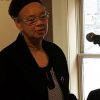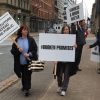FOR IMMEDIATE RELEASE

Cuba’s ambassador to Canada described it as “the most important [academic event] held outside Cuba” to consider the state of the Cuban Revolution after its first 60 years. And “The Cuban Revolution at 60” — last week’s major international conference at Dalhousie University in Halifax — lived up to its billing.
The three-day event that brought together 40 Cuba scholars, policy makers and policy analysts from Cuba, the United Kingdom, Latin America, Europe, the United States and Canada, and featured close to a dozen different panels focusing on key issues including the historical evolution of the Revolution, ongoing social and economic changes in Cuba, US-Cuba relations, Cuba’s relations with the world, surviving climate change and envisioning Cuba’s ecological future.
Josefina Vidal, Cuba’s ambassador to Canada who previously served as her country’s chief negotiator with the US government during the Obama era, and Jeffrey DeLaurentis, Obama’s ambassador designate to Cuba, both offered their personal reflections on the efforts to re-establish relations between the US and Cuba in 2015-16, as well as the current lack of relations under US President Donald Trump.
The conference’s more than 250 attendees also got to hear from keynote speaker Dr. Alon Friedman, a Dalhousie University neuroscientist who talked publicly for the first time about the results of his research into the so-called Havana Syndrome, which affected the health of Canadian and US diplomats in Havana in 2016 and 2017.
The conference program was developed by two of Canada’s best known and respected Cuba scholars, Dalhousie professors John Kirk and Isaac Saney. In 1989, Kirk organized another successful international conference, which took the measure of the Cuban Revolution after its first 30 years.
Kirk and Saney were supported by a team of community and student volunteers led by Sheila Savage, Marilyn MacMullin and Jeanie Kimber who oversaw logistics and venues and made sure the buses — and the program — ran on time. “We couldn’t have done it without them,” Kirk explained.
NSCUBA, a 30-year-old community organization that focuses on building ties between Nova Scotia and Cuba, hosted a reception for attendees at Halifax City Hall. That reception followed a ceremony in the city’s Grand Parade during which Halifax Mayor Mike Savage and Ambassador Vidal dedicated a tree that had been planted to symbolize the important historic ties between Cuba and Nova Scotia — and toasted that friendship with fine Cuban rum.
The conference website — cuba60.ca — was created and managed by yet another Canadian Cuba specialist, Mark Rushton. Now that the conference is over, the website will continue to host — and make publicly available for the next year — many of the papers and presentations delivered during the conference.
A number of scholarly books are also expected to be published out of the conference.
The Cuban Revolution at 60 was made possible by the generous support of the Ford Foundation, the Christopher Reynolds Foundation, the Social Sciences and Humanities Research Council of Canada, WOLA, the Office of the Mayor (Halifax), Dalhousie University, Dalhousie’s Global Health Office, Saint Mary’s University, CUPW, the Canadian Network on Cuba and NSUBA.
For more information: http://www.cuba60.ca
Media: (media@cuba60.ca)



